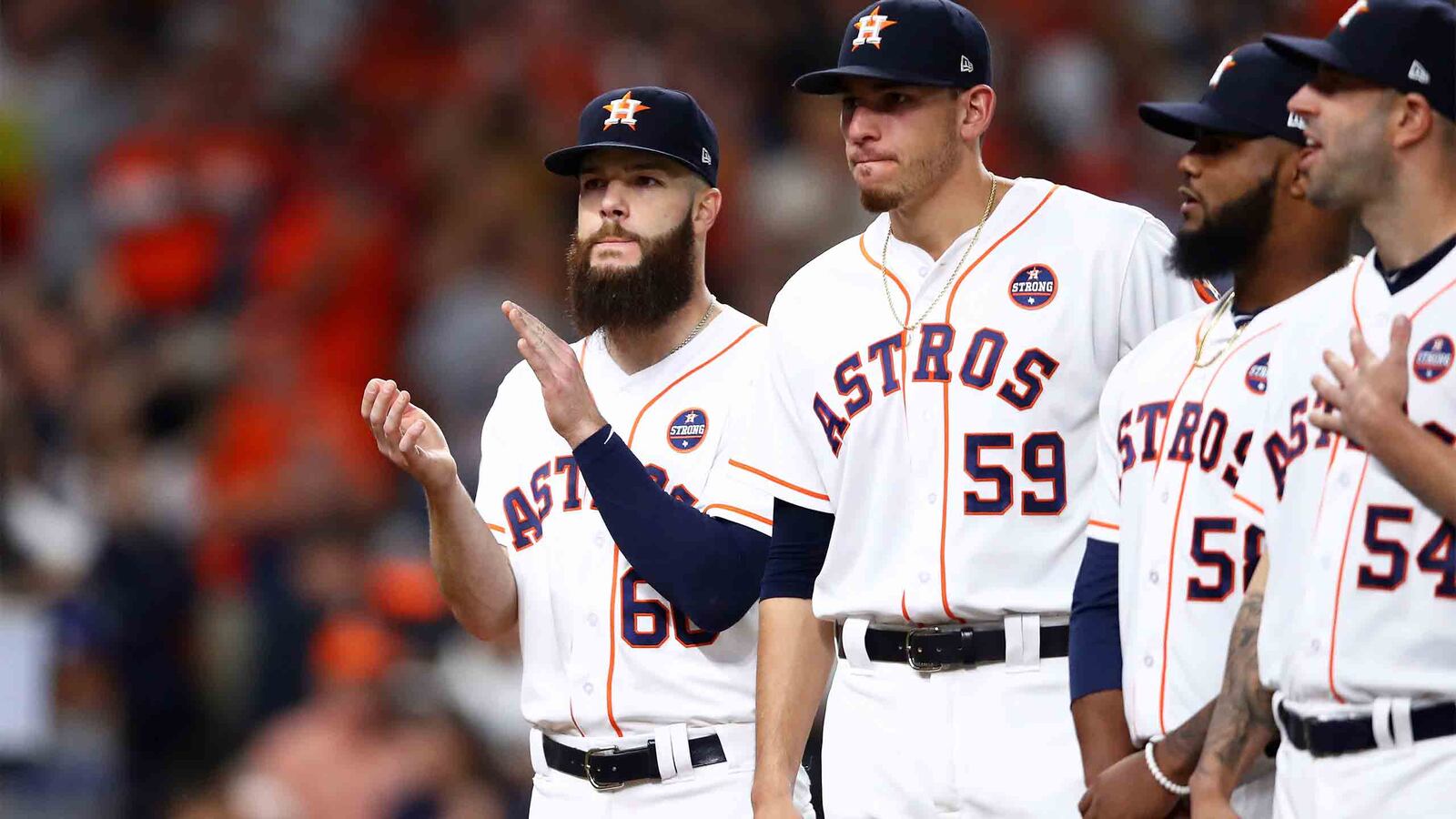Late-inning home runs definitely helped Houston win Game 2 of the World Series, but here’s the formula that will cement a title for the Astros: add two dead movie stars, Ray Milland and Paul Douglas, to their roster; enlist another millionaire, an orange cat named Rhubarb, to sit in owner Jim Crane’s luxury box; and get ghosts, angels or the devil himself to tweet from Minute Maid Park.
My newfound confidence in my hometown team stems from recently binge-watching movies about rotten ballclubs miraculously propelled to a Major League pennant or World Series title. They succeed because of divine or satanic intervention, chemical formulas, oddly broken arms or, in the case of “Rhubarb,” an alley cat owner whose team always wins in his presence. As the Astros were giving up the lead to the Yankees and losing Game 4 in the ALCS, I was in a restaurant talking about the 1951 film “Rhubarb” (let’s just say the service was rather slow that night). When I got home, I watched the movie instead of “SportsCenter.” When the Astros trailed the Yankees by 3 games to 1, I found solace and hope by seeking other postwar movies about magical baseball champions.
Probably the best known of these movies is “Damn Yankees” (1958), from the 1955 Broadway musical in which a Washington Sentors fan makes a Faustian pact. I couldn’t find a full copy of the movie, but the premise is well known: Would you sell your soul to beat the Yankees? After Houston beat New York in Games 6 and 7 to reach the World Series, I better not answer that. The following list may not be complete, but here are other movies in this microgenre:
- “It Happens Every Spring” (1949). Milland as a chemistry professor who becomes an unhittable St. Louis pitcher. Douglas is his affable catcher.
- “Angels in the Outfield” (1951). Before angels, an orphan and a female sports columnist reform him, Douglas is the foul-mouthed manager of the Pittsburgh Pirates. Remade as “Angels in the Outfield” in 1994, with the sequel “Angels in the Infield” (2000).
- “Rhubarb” (1951). This time Milland is the team publicist and cat handler for the Brooklyn Loons. Douglas makes a cameo at the end of the movie.
- “Roogie’s Bump” (1954). A boy with a supercharged arm pitches for the Brooklyn Dodgers, who make cameo appearances. Remade as “Rookie of the Year” (1993).
- “The Kid From Left Field” (1953). A kid becomes manager of the “Bisons.” Remade for TV in 1979, with Gary Coleman.
These fantasies are a subset of magical baseball movies, whose pantheon includes “The Natural,” “Field of Dreams,” and maybe “The Sandlot.” While magical champions may be redemptive, they don’t settle for moral victories. Clearly a few are decidedly amoral or worse. And this being Hollywood, unlikely boy gets title and often the girl, too (kudos, Astros ace Justin Verlander, for already snagging Kate Upton). With the exception of “Damn Yankees,” magical champion movies don’t approach cinematic art – especially the ones with child actors and real ballplayers. Still, they have certain charms, including a range of baseball verité.
My favorite of the bunch remains “Rhubarb.” It doesn’t rely on ghosts, children or big-name ballplayers, but Leonard Nimoy has an uncredited role as one of the Loons who refuse to play for an owner cat. The movie nails the Brooklyn-Manhattan geopolitical rivalry (the opposing Manhattan team is unnamed). But it doesn’t bother explaining why Rhubarb’s presence at home and road games propels the team to move from the cellar to first place. As a 2010 Tiger fan blog post points out, “Rhubarb” has something for everyone, including bad guys and good guys committing dubious deeds for self-preservation. Director Arthur Lubin also helmed “Francis the Talking Mule” movies and created television’s “Mr. Ed” when he couldn’t secure mule rights for the small screen.
Its star, a cat named Orangey, was a two-time Patsy winner for best animal actor, first for “Rhubarb” then “Breakfast at Tiffany’s.” That’s range. A decade after playing athletic and amorous Rhubarb, he was Audrey Hepburn’s “slob” of a soulmate, Cat. Between his award-winning performances, he menaced “The Incredible Shrinking Man” (1957), a less depressing version of Richard Matheson’s 1956 book in which gender politics are as threatening as predatory men.
I stumbled across H. Allen Smith’s 1946 book “Rhubarb” long after I’d first seen the movie. It made it clear why the movie is more satirical than sappy. Smith spews cynicism, distrust, lunacy and lots of sex. The Loons’ owner is a cursing, mean-spirited, public-hating animal abuser who hosts a party where 12 prominent sportsmen get 15 minutes to do whatever with naked women. One New York Times reviewer complained: “When invention fails him, he falls back on sex. Faced with fact, Mr. Smith knows how to make it gaudy and amusing and caustic. “
Smith’s passage on page 75 remains a legitimate critique of the relationship between journalism and sports teams. The protagonist joins the Loons after losing his sportswriting job:
He wrote sarcastically about the role newspapers play in sports, pointing out how the average metropolitan paper devotes three or more solid pages to the free advertising of sports events, which are, taking the commercial point of view, no different from January clearance sales. Why? he demanded. If a man in the business of staging prize fights can be certain of five million dollars’ worth of free advertising, why shouldn’t a man who manufactures rattail files get his proportionate share?
Besides Ray Milland and Paul Douglas, I started looking for common threads in these movies. I discovered that “Rhubarb,” “It Happens Every Spring” and the original “Angels in the Outfield” all had female screenwriters, perhaps because these movies are more like romantic comedies or family films and less like baseball fables. Still, female characters make an impression beyond being “dolls.” Janet Leigh becomes a sports columnist in “Angels in the Outfield.” “Rhubarb” has women well represented in the stands and as bettors and bookies (including one named Mona Lizzie). In “Roogie’s Bump,” working women are trying to make ends meet.
Because I’m an African-American, I couldn’t help noticing where blacks appeared or didn’t appear in these postwar movies, which were completed after baseball’s historic re-intergration. “Rhubarb” was released one year after the 1950 movie “The Jackie Robinson Story.” But “Rhubarb’s” Brooklyn is only white, ignoring the fact that blacks spectators helped make up for whites who quit attending Dodger games. In “Angels in the Outfields,” also released in 1951, two black men are easily spotted in scenes at the Forbes Field – they and a stadium full of white extras wear the same distinct clothes even though the scenes are supposed to take place on different game days. In “Roogie’s Bump,” released in 1954, future Hall of Famer Roy Campanella, one of the Dodgers’ African-American pioneers, has several speaking lines; in one scene, the movie cuts to cheering black fans after Robinson scores a run.
I didn’t start out watching these movies through an identity lens and don’t care to dissect them any further. I don’t know if the black performer in the “Damn Yankees” chorus line of ballplayers is someone famous I should know. The color and gender of people in the stands is inconsequential in baseball comedies, for the most part, but it’s meaningful to me. My parents and their friends, having lived in Jim Crow South, enjoyed going to the Houston Astrodome after it opened in 1965. From my elementary-school perspective, they didn’t care whether Houston won or lost. I later learned that Judge Roy Hofheinz, the man behind the space-age indoor stadium, had promised Houston Negroes than they would be treated as equals inside the dome if they voted to finance it. What I remember is seeing my family proudly tipping the whites who showed them to their seats and called them “sir” and “ma’am.”
That was a far greater victory than anything the Astros could do on the field – then and now – and it beats any Hollywood ending, no magic necessary.
Kathleen McElroy, a native Houstonian and a former sports journalist, is associate director of the School of Journalism at the University of Texas at Austin.






